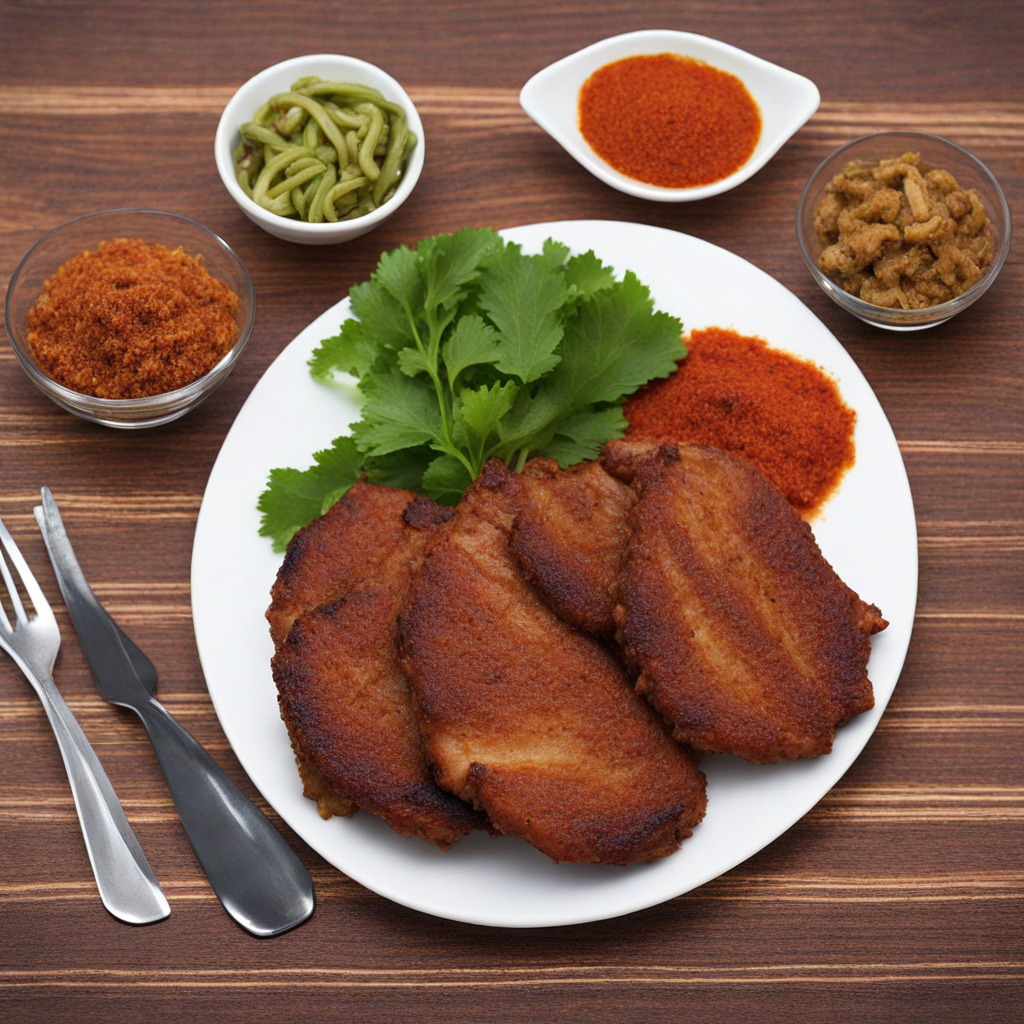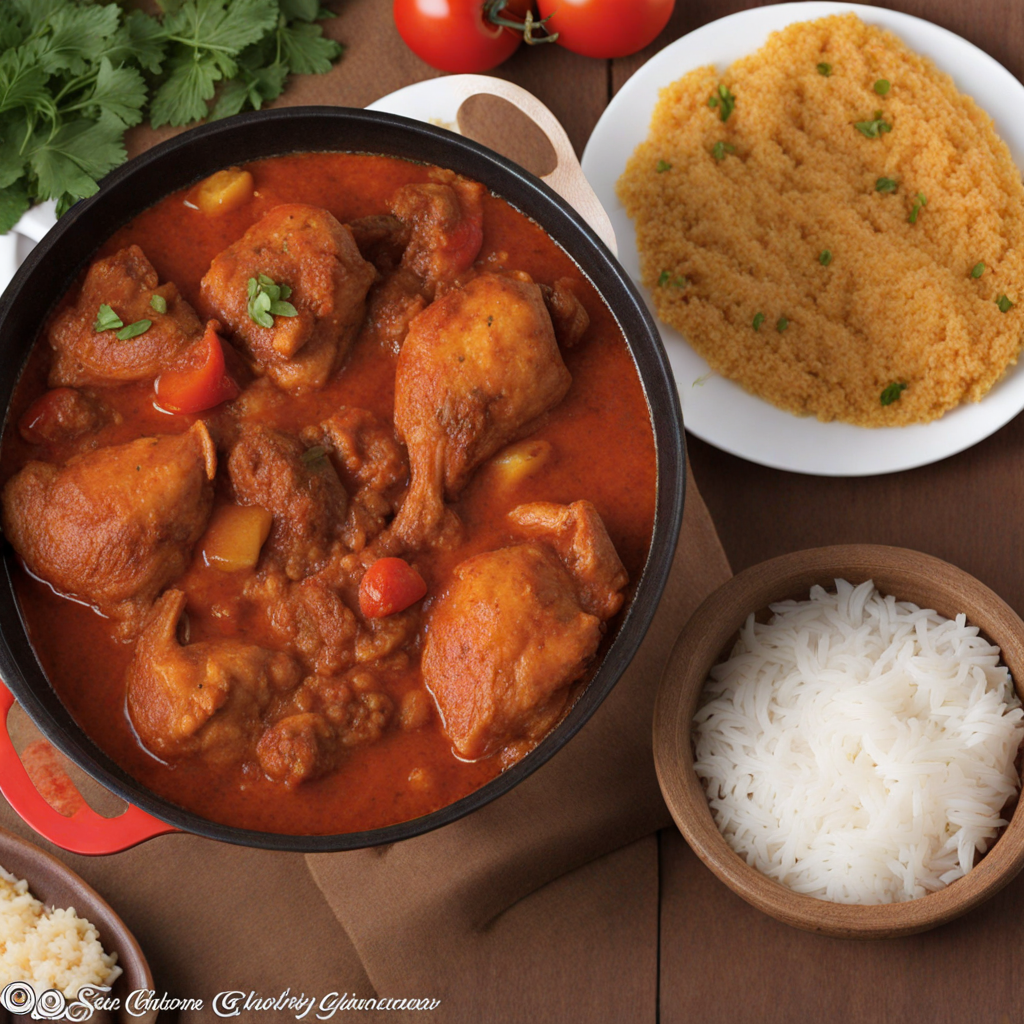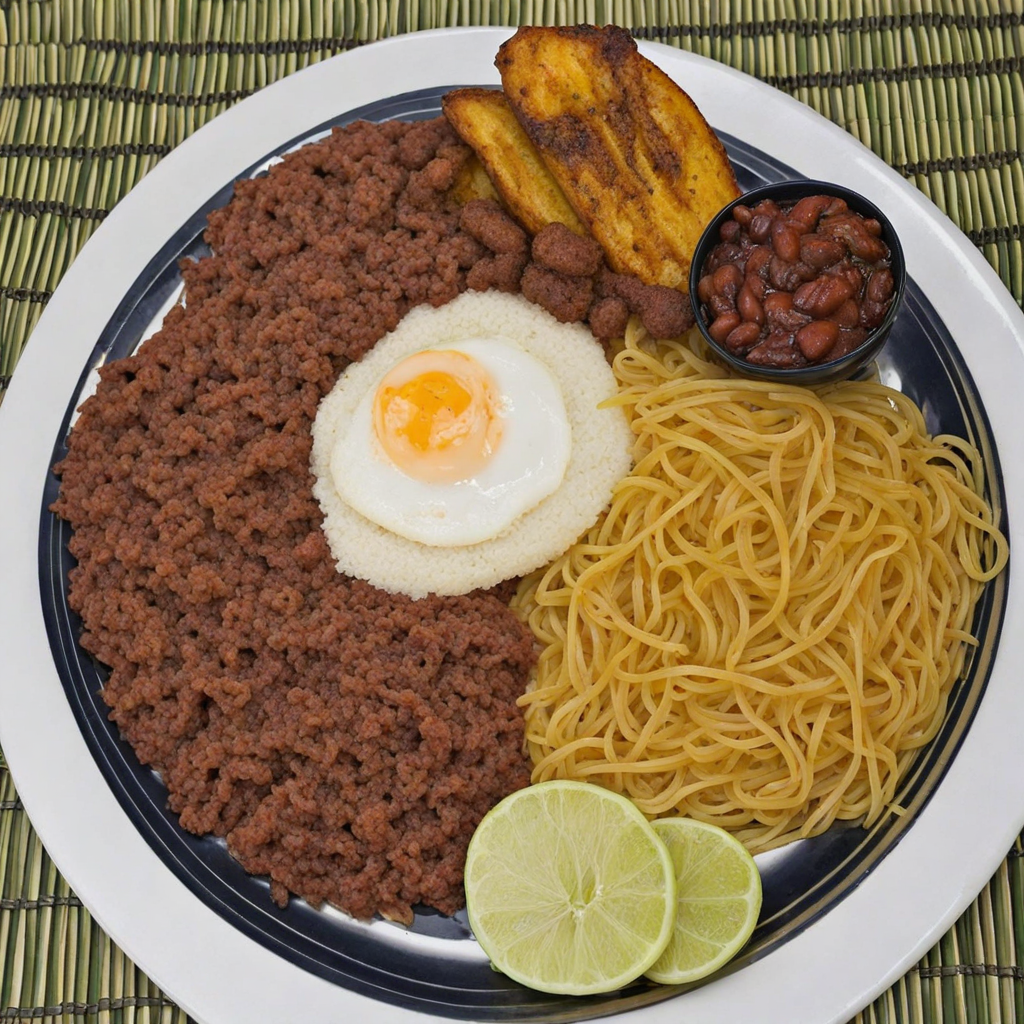Spiced Pork
Spiced Pork, a delectable dish hailing from Ghana, showcases the rich culinary traditions of West Africa. This dish features tender cuts of pork that are marinated in a vibrant blend of spices, herbs, and aromatics, creating a symphony of flavors that tantalize the palate. The marinade typically includes ingredients like ginger, garlic, cayenne pepper, and a mix of local spices, which infuse the meat with a warm heat and depth that is characteristic of Ghanaian cuisine. The balance of the spices is crucial, allowing the natural sweetness of the pork to shine through while adding complexity to each bite. Once marinated, the pork is often grilled or slow-cooked, allowing the flavors to deepen and the meat to become incredibly succulent. The cooking process caramelizes the exterior, giving it a beautiful golden crust, while the inside remains juicy and packed with flavor. This method not only enhances the taste but also adds a smoky aroma that is irresistible. Spiced Pork is commonly served with traditional sides such as jollof rice, fried plantains, or a fresh vegetable salad, providing a delightful contrast in textures and flavors that complements the richness of the meat. Eating Spiced Pork is not just about the taste; it's also an experience steeped in culture and community. In Ghana, sharing a meal of Spiced Pork can bring friends and family together, often served during celebrations or gatherings. The dish embodies the warmth and hospitality of Ghanaian people, inviting diners to savor not just the food but also the stories and traditions that come with it. Each bite transports you to the heart of Ghana, making Spiced Pork a must-try for anyone looking to explore new culinary horizons.
How It Became This Dish
The Rich Tapestry of Spiced Pork in Ghana #### Origins and Early Influences The culinary landscape of Ghana is a vibrant tapestry woven from the threads of its diverse ethnic groups, each contributing unique flavors and techniques. Among these is the revered dish known as Spiced Pork, which reflects a blend of indigenous practices and external influences, particularly from the Portuguese and other European traders who arrived on the West African coast in the 15th century. Pork itself was not traditionally a staple in many West African cultures, primarily due to Islamic dietary laws prohibiting its consumption. However, among the Akan people and certain other ethnic groups, pigs were raised and consumed, especially in regions where the influence of Islam was less pronounced. The domestication of pigs in Ghana can be traced back to early agricultural practices, where they were valued not only for their meat but also for their role in subsistence farming, as they helped manage waste and control pests. #### The Evolution of Spiced Pork The preparation of Spiced Pork in Ghana is a product of centuries of culinary evolution. Initially, pork was prepared simply, often roasted over open flames. However, as trade routes expanded and cultural exchanges flourished, spices and cooking techniques from various regions began to infiltrate the Ghanaian palate. The Portuguese brought with them a wealth of spices, including chili peppers, garlic, and various herbs, which were integrated into local cooking. The introduction of these elements transformed the way pork was prepared, leading to the development of what is now recognized as Spiced Pork. This dish typically features marinated pork, seasoned with a robust mixture of spices that may include black pepper, ginger, thyme, and the ever-popular chili pepper, which adds a distinctive heat. #### Cultural Significance Spiced Pork holds a special place in Ghanaian culture, often associated with communal gatherings and celebrations. It is not uncommon to find this dish served at weddings, festivals, and other significant events, where it symbolizes hospitality and generosity. The act of sharing a meal is deeply rooted in Ghanaian culture, and Spiced Pork, with its rich flavors and aromatic spices, serves as a centerpiece that brings families and friends together. In addition to its role in social gatherings, Spiced Pork also has a place in traditional rites and ceremonies. In some communities, it is prepared as an offering during important rituals, showcasing its significance beyond mere sustenance. The dish also highlights the agricultural practices of the region, as it often features locally sourced ingredients, including fresh herbs and spices, thus connecting people to their land and heritage. #### Modern Developments and Variations As Ghana has evolved, so too has the preparation and consumption of Spiced Pork. In the late 20th and early 21st centuries, globalization and the increasing influence of the diaspora have introduced new techniques and flavors to traditional dishes. Today, chefs and home cooks alike experiment with Spiced Pork, incorporating international flavors while respecting its roots. For instance, fusion cuisine has emerged, with dishes like Spiced Pork Tacos or Spiced Pork Stir-Fry gaining popularity in urban centers. These modern iterations often blend traditional Ghanaian spices with global culinary techniques, resulting in innovative dishes that appeal to a broader audience. Street food vendors have also embraced the popularity of Spiced Pork, offering it in various forms—from skewers grilled over charcoal to sandwiches stacked high with marinated pork and local toppings. #### Health and Sustainability Considerations In recent years, there has been a growing awareness of health and sustainability issues surrounding meat consumption. As a result, many Ghanaians have begun to adopt a more mindful approach to their diets. This shift has prompted discussions about the sourcing of pork and the importance of ethical farming practices. Local farmers are increasingly focusing on sustainable methods, ensuring that their pork is raised humanely and without the use of harmful additives. This is particularly significant in a country where agriculture remains a backbone of the economy. By supporting local farmers who prioritize ethical practices, consumers can enjoy Spiced Pork that not only tastes good but is also good for the environment. #### Conclusion: A Culinary Legacy Spiced Pork in Ghana is more than just a dish; it is a reflection of the country’s complex history and rich cultural heritage. From its humble beginnings as a simple roasted meat to its current status as a beloved centerpiece of celebrations, Spiced Pork has undergone significant transformation while remaining true to its roots. As new generations of Ghanaians embrace their culinary heritage, there is an exciting future ahead for Spiced Pork. The dish continues to evolve, incorporating new flavors and techniques, while also paying homage to the traditions that have shaped it. Whether enjoyed at a family gathering, a festive celebration, or as part of a modern culinary experiment, Spiced Pork remains a delicious testament to the resilience and creativity of Ghanaian cuisine. In essence, Spiced Pork is a culinary journey that encapsulates the heart of Ghana, inviting both locals and visitors alike to savor its flavors and appreciate the stories behind each bite. As Ghana continues to grow in the global food scene, the legacy of Spiced Pork will undoubtedly endure, cherished by generations to come.
You may like
Discover local flavors from Ghana







